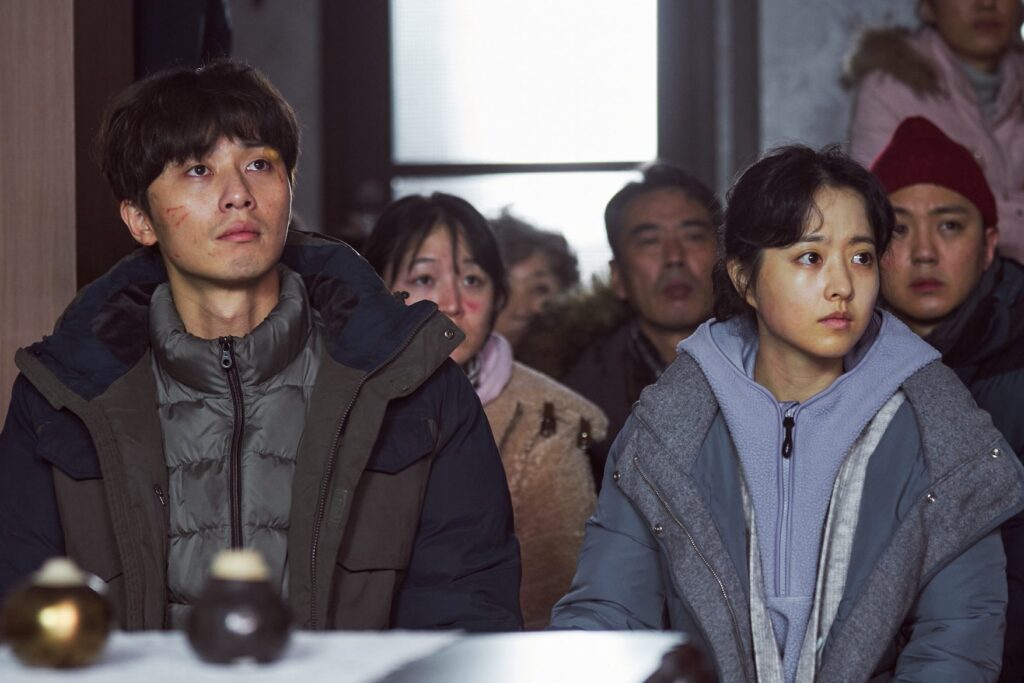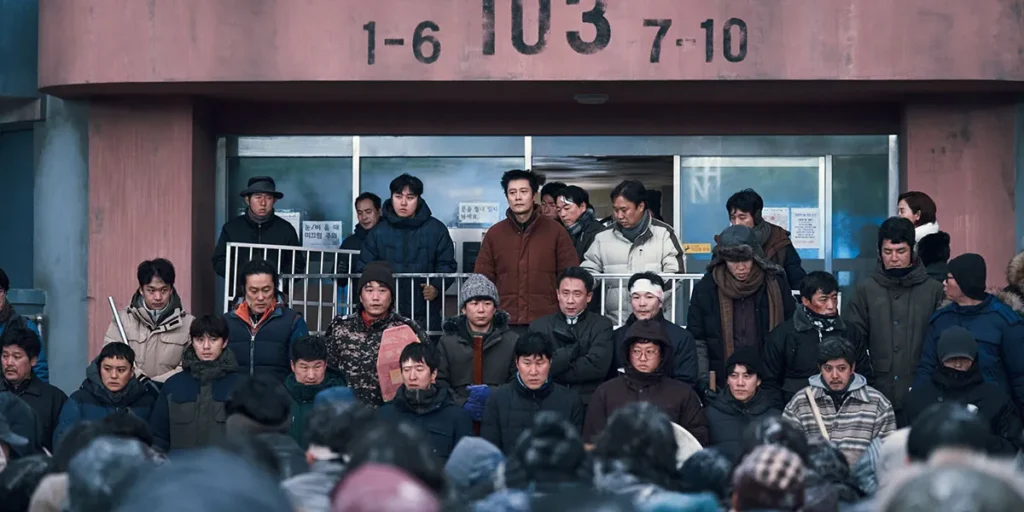
South Korea consistently makes some of the most interesting movies on the planet, and the ideologically-laden and visually-rich Concrete Utopia is one of the best South Korean films of 2023. That means director Um Tae-hwa has made one of the best films of the year.
The Korean Film Council knew this, of course, and elected the film as the official entry for the country at this year’s upcoming Academy Awards. Given the country’s recent success at the Oscars, on top of the remarkable quality of the genre-bending post-apocalyptic film, no one should be surprised if the title ends up shortlisted for Best International Feature either (though The Zone of Interest and Fallen Leaves will likely remain the frontrunners).
After a few decades of journeymanning in a variety of crew positions, including as an assistant director for three of Park Chan-wook’s works (notably Sympathy for Lady Vengeance, 2005), and his 2017 victory at the 54th Grand Bell Awards for Best New Director with his debut feature Vanishing Time: A Boy Who Returned, Um establishes himself as one of the essential filmmakers to monitor in South Korea. Concrete Utopia adapts and expands Kim Sungnyung’s webtoon “Pleasant Bullying.” The premise is allegorically simple: all of Korea, perhaps the world, has been destroyed by an earthquake…other than one apartment building. The residents of the building reshape society and fight off the non-resident survivors as they form a new, fascistic governing system. By limiting the vantage point into the destruction, Um denies the spectacle of the destruction picture—this is not San Andreas (2015) or Greenland (2020)—and, ironically, he elevates the scale of the destruction in the process. Um turns the bustling and crowded Seoul into a landscape of loneliness surrounded by a sea of concrete.
The following interview has been condensed and edited for clarity. The conversation took place over Zoom and was limited to about 30 minutes, mediated by translator Kaila Wang.
BOSTON HASSLE: Let’s start with an easy one. When did you first fall in love with movies? Was there a specific movie or director that just made everything click for you?
UM TAE-HWA: I remember when I was in elementary school we had this English channel that was showing a film on television. I saw this scene that was very memorable: a skeletal robot coming out of fire. That was very memorable to me. Later on, I recorded that on VHS and watched it on tape until the recording broke. And that turned out to be the first Terminator.
When Terminator 2: Judgment Day came out, I ran to the theater to watch it. Because I watched those two films when I was very young, they set a sentiment as an adult that I still carry.
When I got older, I really liked Fargo by the Coen Brothers—I love all of their films. I found their black comedy really interesting. I mention these two films as two films I cherished as a child. But when I look back, I think they are the base of Concrete Utopia as well.
BH: The gray, sad look of the destroyed city is very impactful, but you rather deliberately chose not to delight in the spectacle of destruction—which is a pretty unique choice for the genre. Can you walk me through the rationale to not delight in the destruction?
UM: This movie deals with the disaster, but the disaster itself is not the focus. It’s more important to show the post-disaster. I wanted to only show the destruction through the eyes of the characters and to only show it as far as their eyes could see, and that way you can actually feel the fear of these characters. These fears determine the reasons for their actions. And instead of it just being an entertaining element, I wanted the audience to only see what they see.

BH: The destruction of Seoul almost has a biblical feel to it, and there are many Christian images in the film, including the stained glass in the penultimate scene. Why did you choose to frame the story through Christian iconography and themes?
UM: So, in Korean society, apartment living has almost become a religious value and an obsession to people. Using the real Christian metaphors, I wanted to ask whether this belief in the apartment is valid.
And Yeong-tak’s real name is Moses-beom, so I wanted to bring the story of Moses. I also wanted to show the relationship between the Israelietes and Moses in the Book of Exodus. For example: the staff carried by Yeong-tak, the blood on the doorposts, he sort of does this miraculous act to make the water come out.
But in the end, it turns out that Yeong-tak is fabricated. He’s not a real person. This questions whether or not the belief for this apartment is valid.
BH: Park Seo-joon plays a pretty new role for him, a less innocent and more complicated role than the parts that made him famous, such as in Midnight Runners (2017) and The Divine Fury (2019). What did you see in him that made him right for the role of Min-seong/602?
UM: I wanted the main character to be a very ordinary person, a symbol of ordinary people. This is why his job is a civil servant, so as to not stand out. He is just an average person and lives just like everyone else.
Park Seo-joon is very famous in Korea. He’s known for playing very handsome and kind of cool characters. But I thought that he would be able to do very well playing this very ordinary character—and when he’s done this before, he has been great—so I had no doubts. Later on, when you see the character transforming into a different person, I thought, with his experience, that he would be able to portray this character very well.
BH: This is adapted from a webtoon. What was your philosophy when adapting the work? How close did you remain to the source material?
Um: When I first read the webtoon, the most interesting part for me was the background of the story: there’s only one apartment building that’s remained after everything else has collapsed. The webtoon starts when everyone has returned to this apartment, but the new system of the building has already been established to a point. The protagonist’s fears seeing that new system that’s been built in the apartment. But what I wanted to talk about was how the system was built within the apartment and I thought that this way I could show people’s desires for apartments in Korean society could be shown through this process.
BH: Congratulations on the film and on representing South Korea at the Academy Awards.
UM: Thank you!
Concrete Utopia opens Friday, 12/15 @ AMC Boston Common – watch this space for the Hassle‘s review!

